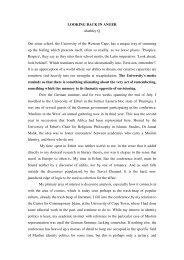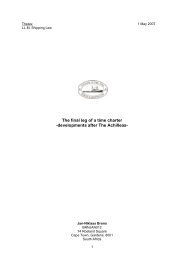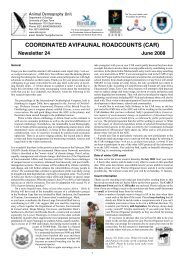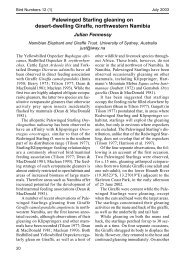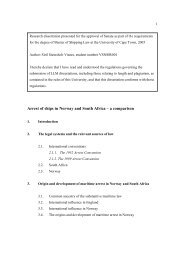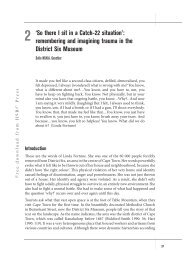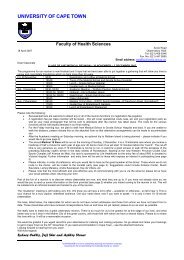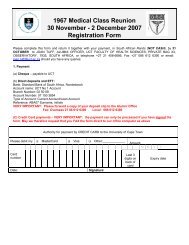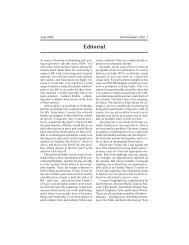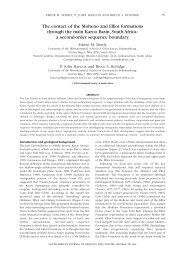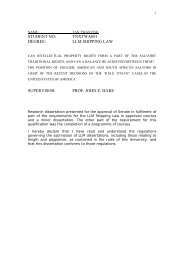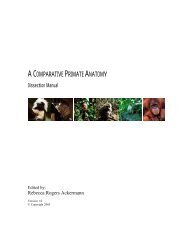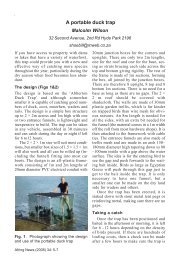insanity.pdf
insanity.pdf
insanity.pdf
You also want an ePaper? Increase the reach of your titles
YUMPU automatically turns print PDFs into web optimized ePapers that Google loves.
Africa 11<br />
episodes of sexual abuse at the hands of another. The physical and<br />
psychological trauma which characterises sexual abuse triggers the<br />
dissociative episode resulting in an altered state of consciousness. He or she<br />
‘blocks out’ the painful episodes and experiences<br />
amnesia for these events. Consequently the person is<br />
unable to relate any of these experiences as they are<br />
inaccessible to conscious memory. Mounting a defence<br />
of sane automatism<br />
In order to mount a defence of sane automatism it must be proven that the<br />
there has been an antecedent build-up such as a period of conflict or dispute<br />
which the person has experienced. The dissociative episode which the person<br />
undergoes must have been caused by some external trigger mechanism For<br />
example, a person a who has been experiencing marital difficulties may be so<br />
overwhelmed by the news that his or her is spouse is filing for divorce that he<br />
or she reacts violently and murders the spouse. Consequently, he or she may<br />
have no conscious memory of this action because of the extreme nature of the<br />
emotional reaction (in this example, rage), which completely overwhelms the<br />
conscious mind and renders him or her incapable of goal-directed action.<br />
Where such a claim is made, the psychologist has to assess whether the<br />
accused experienced a discrete dissociative episode at the time of the murder.<br />
An integral part of this diagnosis is whether the person has amnesia for the<br />
event. This diagnosis is15 difficult to make in that the psychologist relies on<br />
the accused’s version of events, which may not always be reliable. The<br />
assessment as to whether the person has a true absence of memory for that<br />
discrete period is also problematic, given that the clinician again relies on the<br />
accused’s account. On one hand, it may be more plausible that a person<br />
‘blocks out’ memories of situations in which they have<br />
been victimised, while on the other, it is more difficult<br />
to accept such claims made by a person who is the<br />
victimiser. While the question of the veracity of such<br />
claims falls within the ambit of the court, the<br />
psychologist is to a certain extent placed in the position of assessing the<br />
accused’s truthfulness. In essence one has to ask whether it is plausible that<br />
someone who commits a crime triggered by an external stressor is so<br />
overwhelmed by emotion, that he or she has no memory of it.<br />
For example, in S v Pederson [1998] 3 All SA 321, the appellant appealed<br />
against his conviction for the murder of his estranged wife. The appellant<br />
claimed that he had not acted consciously and voluntarily in killing his wife<br />
and that even if the act was voluntary, he had no intention of murdering her.<br />
He claimed that he was under the influence of alcohol and had been angry and<br />
aggressive because his wife was leaving him. There was a history of domestic<br />
violence which culminated in the stabbing of the wife. The appellant claimed<br />
to have no recollection of the incident as he had experienced an acute<br />
catathymic crisis at the time of the murder. The psychological evidence<br />
defined this crisis as a ‘mental storm’ which overwhelmed his mental capacity<br />
such that he was unable to exert control over actions. The Court questioned<br />
whether the Appellant had experienced a true absence of memory for the<br />
incident or whether the amnesia served the purpose of repressing the trauma<br />
caused by the incident. The Court held that for the defence of sane automatism<br />
to succeed, the Appellant had to prove that he had experienced true amnesia<br />
Activity 8.910.<br />
Explain what is meant by the voluntariness<br />
of an act.<br />
Activity 8.1011<br />
Give three examples of psychological<br />
blows which may result in sane automatism



